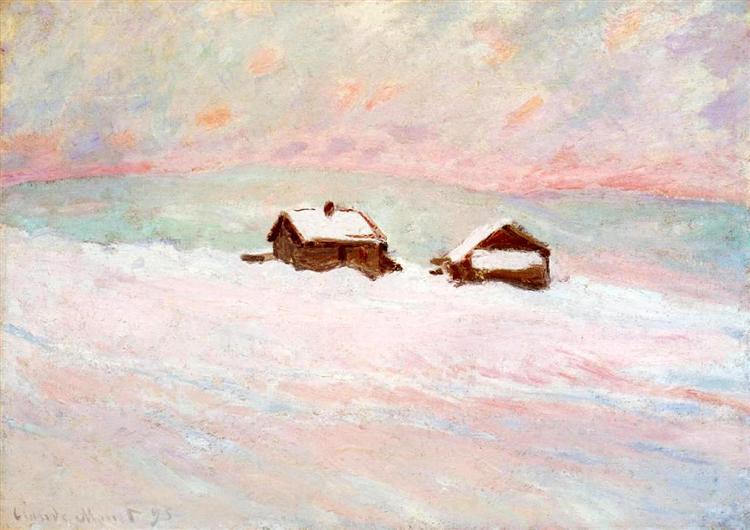Kuvaus
Claude Monetin "Casas in La Snow - Norja - 1895" on kiehtova todistus tästä kyvystä mestari impressionismia, joka onnistui vangitsemaan luonnon lyhytaikaisen kauneuden ja sitä ympäröivän ilmakehän mestarillisessa toteutuksessa. He ympäröivät heitä hiljaisuuden ja rauhallisuuden maailma, joka heijastuu heidän paletinsa pehmeisiin sävyihin, jotka ovat vallitsevia talvimaailmassa. Vaikka tämän maalauksen erityinen konteksti on vähemmän tunnettu verrattuna muihin ikonisiin Monet -maisemiin, sen esitys norjalaisesta maisemasta on yhtä kiehtova.
Etualalla katsoja tapaa sarjan taloja lumen peitossa ympäristössä. Jokainen rakenne on kääritty valkoiseen vaippaan, joka heijastaa sekä valoa että talven rauhaa. Monet käyttää löysää ja nopeaa harjakokojen tekniikkaa antaakseen elämän lumen antamiseen, mikä antaa sille kuvioita, jotka vaikuttavat melkein tuntuvilta. Lunta, vaikkakin pääosin valkoista, animoivat sinisen ja harmaan vivahteet, mikä viittaa teokseen ominaiseen päivänvaloon ja kylmään ilmapiiriin.
Koostumus paljastetaan rakenteellisen yksinkertaisuuden tutkimuksen. Talot ovat yksinkertaisilla tavoilla ja sammutetuilla sävyillä integroituna laajempaan maisemaan, mikä esittelee harmonian tunteen arkkitehtuurin ja sen luonnollisen ympäristön välillä. Monet, joka tunnetaan kyvystään vangita valo, käyttää tässä sumu- ja pehmeät värien vastakohtana viitaten Norjan talven kylmään ilmapiiriin. Valo on hienovarainen, mutta on läsnä, suodattaen herkästi maalin elementtien välillä ja antamalla katsojalle tuntea talvi ilman tuoreuden.
Maalauksessa ei ole ihmishahmoja, jotka korostavat lumisan maiseman eristyneisyyttä ja rauhallisuutta. Tämä lähestymistapa ihmisen toiminnan puuttuessa vahvistaa vuoropuhelua luonnon kanssa ja herättää ajatuksen hiljaisesta ja yksinäisestä maailmasta. Tämän valinnan kautta Monet syventää maiseman pohdintaa, antaen katsojan pohtia ihmisen ja luonnon välistä suhdetta. Vaikka voidaan ajatella, että talvi on passiivisuuden aika, Monetin maalaus hengittää taustalla olevaa elämää, joka viittaa siihen, että jopa hiljaisuuden hetkinä on elinvoimainen kauneus.
Tämä teos on linjassa impressionismin kehityksen kanssa, jossa Monet ja sen aikalaiset yrittivät vangita valoa ja väriä puhtaimmissa muodoissaan. Näkyvä siveltimen tekniikka ja valon innovatiivinen käyttö heijastavat Monetin halua kaapata hetken, ilmakehän vaikutukset maisemaan ja tapa, jolla väri on vuorovaikutuksessa valon kanssa. "Talot lumessa" voidaan pitää virstanpylvänä tässä haussa, jossa todellisuudesta tulee aistinvarainen kokemus kuin yksinkertainen esitys.
Monetin taipumus talvimaiseman teemaan on kirjattu hänen teoksiinsa, ja "Houses in the Snow - Norja - 1895" tulee loistava esimerkki sen kyvystä tulkita maailmaa omien kokemustensa kautta. Tämä työ kehottaa katsojia eksymään omaan mielikuvitukseensa pohtimaan syvää yhteyttä ihmiskunnan ja luonnollisen ympäristön välillä. Siten tämä maalaus ei vain heijasta Monetin teknistä hallintaa, vaan myös hänen aitoa kiehtovuuttaan luontoon ja hänen horjumattomaan haluaan vangita sen olemusta.
KUADROS ©, kuuluisa maali seinällesi.
Käsivalmistetut öljymaalaukset, ammattitaiteilijoiden laadun ja erottuvan sinetin kanssa KUADROS ©.
Kuvien jäljennöspalvelu tyytyväisyystakuu. Jos et ole täysin tyytyväinen maalauksen jäljennökseen, palautamme rahasi 100%.

